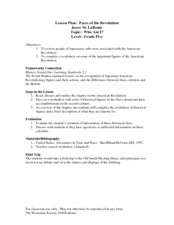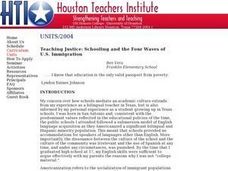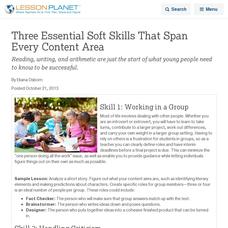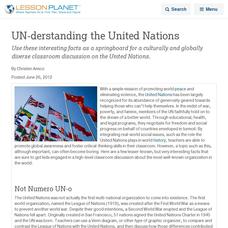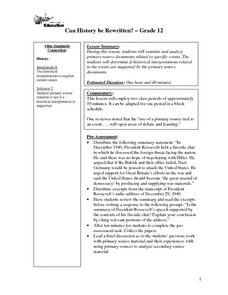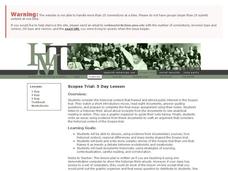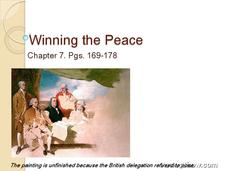Curated OER
Lesson 2: Geography Determines History
Students describe the geographic location of the Creek War and analyze the importance of geographic location in planning battles. They debate the relavence of the statement: geography determines history.
Curated OER
A Songwriter Not Silenced - Lesson 2
Students discuss how a musician's message can influence society and government. They debate if political viewpoints should be publicized in music.
Curated OER
Faces of the Revolution
Fifth graders investigate the important figures of the American Revolution. In this American Revolution lesson plan, 5th graders outline the important events of the war and complete a worksheet.
Curated OER
First Black US Congresswoman Dies
In this English worksheet, students discuss Shirley Chisholm. Students debate and discuss American politics, focusing on Shirley Chisholm. Students discuss the differences compared to their own country of origin.
Curated OER
Rusyns Survive Time in Central & Eastern Europe
Tenth graders study the different ethnicities in Europe. In this Eastern Europe ESL lesson, 10th graders read an article and complete guided questions. Students participate in a debate.
Curated OER
Turmoil in Thailand: The Battle of Bangkok
Tenth graders examine the battle of Bangkok. In this Conflict in Thailand lesson, 10th graders read an article about the causes and effects of the Battle of Bangkok. Students participate in a debate about whether or not to visit the city...
Curated OER
Confict, Consensus, and Conclusion
Young scholars debate the key issues dealing with women's rights and the rights of African Americans during and after the Civil War. They analyze the women's rights movement in relationship to the desire for suffrage. They utilize the...
Curated OER
Do Suspected Enemies Have Rights?
Students investigate the history of Japanese immigration. They complete an online Webquest, explore various websites, answer discussion questions, and locate and read newspaper articles about enemy compatants.
Harry S. Truman Library & Museum
Marshall Plan: Convince the American People
This is an excellent resource for US history classes, especially AP history. After learning some background on the Marshall Plan, the class, divided into two groups, researches opposing positions on this aid program. Groups read and...
Curated OER
Giving Peace a Chance
In honor of International Peace Day, students can learn about the challenges we face in the world.
Constitutional Rights Foundation
How the First State Constitutions Helped Build the U.S. Constitution
Did you know that the United States Constitution was adopted after many state constitutions were already in place? Young scholars examine facts about the influence of states through an informative and interesting resource. Groups then...
Curated OER
Teaching Justice: Schooling and the Four Waves of U.S. Immigration
U.S. immigration is the focus of a unit on social justice. Over the course of a school year, young historians read a variety of texts to learn about four waves of immigration that have occurred over time in the U.S. An emphasis on...
Curated OER
Three Essential Soft Skills That Span Every Content Area
Reading, writing, and arithmetic are just the start of what young people need to know to be successful.
Curated OER
Ancient Greece and Ancient Rome Unit Plan
Students make two T charts, one for Sparta and one for Athens, showing pros and cons for living in either city-state. They use the physical information from the map and the cultural captions given for Athens and Sparts to come to their...
Curated OER
UN-derstanding the United Nations
Use these interesting facts as a springboard for a culturally and globally diverse classroom discussion on the United Nations.
Curated OER
Witch Hunt or Red Menace? Anticommunism in Postwar America, 1945-1954
Learners investigate the goals and methods of the House Un-American Activities Committee and offer an opinion regarding whether their investigation of Hollywood was justifiable.
Curated OER
Can History Be Rewritten?
Can history be rewritten? Or, more precisely, is history documented accurately? High school juniors and seniors compare primary source material with secondary sources. For example, they compare President Roosevelt's December 29, 1940...
Curated OER
The Worldly Philosophers by Robert Louis Heilbroner
CliffsNotes provides a list of study questions to help your high schoolers grapple with The Worldly Philosophers. Some of them are simple and straight forward, while others offer an opportunity to dig in deeper! Consider printing this...
Curated OER
Why Do Governments Exist? Locke, Hobbes, Montesquieu, and Rousseau
Here is a great secondary source reading that includes the primary ideas and philosophies of the famed Enlightenment philosophers: Thomas Hobbes, John Locke, Charles Montesquieu, and Jean-Jacques Rousseau. In additional to discussing...
Annenberg Foundation
Egalitarian America
What does a true American represent? Scholars investigate the equal rights era of the 1960s and 1970s in the 20th installment of a 22-part series on American history. Using photographic, magazine, written, and video evidence, groups...
Center for History Education
Women's Rights in the American Century
Today, many young people find it hard to understand why it took over 150 years for women in the United States to get the right to vote—why there was even a need for the suffrage movement. As they read a series of primary source...
Curated OER
Victory in the Pacific, 1943-1945
Students examine the military campaigns of the Pacific theater, tracing the path of the Allied offensives. The lesson presents what the Allies were trying to accomplish and why.
Historical Thinking Matters
Scopes Trial: 5 Day Lesson
Did Scopes violate the Butler Act? Why did so many Americans follow the Scopes trial? See analytical reading in action with a fantastic five-day lesson plan in which class members consider the historical context that provoked public...
Power Show
Winning the Peace
There is a price for peace. The information and images contained in this 19-slide presentation illustrate the compromises necessary and the costs to those who backed the losing side in the battle for American independence.
Other popular searches
- Mexican American War Debate
- Cold War Debate Questions
- Civil War Debate
- Civil War Debate Topics
- Cold War Debate
- Middle East War Debate Causes


